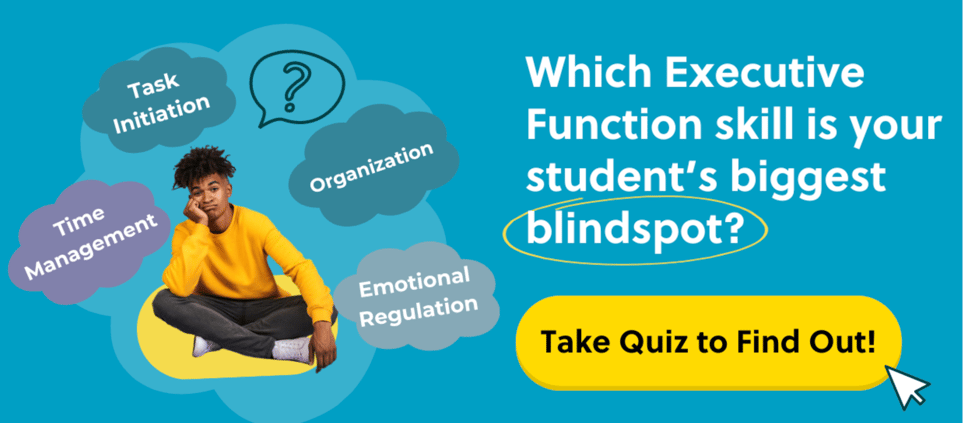What Are Executive Functioning Skills?
Executive Function is a set of cognitive skills that help students (and adults) plan ahead, stay organized, manage thoughts and behaviors, and stay focused on a task. These self-management skills are crucial for students in achieving their goals both in the classroom and in everyday life. Executive Function skills are developed over time and can be improved with practice.
As the demands of school increase each year, having well-developed Executive Function skills will enable students to be more effective in school. We have a good understanding of the development of Executive Function skills by age and grade, making it easier to recognize when kids are struggling. Students who have been diagnosed with ADHD or other learning differences often have Executive Function challenges. However, not all students who struggle in this area have a formal diagnosis. By providing children with the support they need, we can help them develop the Executive Function skills they need to succeed in school, work, and life.
Strong EF Skills Are The Key to Academic Success
What Are Executive Functioning Skills for Student Success?
Students are expected to have well developed Executive Functioning skills by the time they reach high school, but unfortunately these critical life skills are not typically taught in elementary school or middle school. With expert guidance and structure, students can learn to effectively manage themselves so that they are equipped for taking on challenges in school or in life. Consistent academic performance requires stamina which is built on a foundation of solid skills. Some important Executive Functioning skills for students include:
- Time management
- Organizing thoughts and materials
- Paying attention
- Planning and prioritizing
- Getting started (task initiation)
- Shifting between tasks flexibly
- Staying on track
- Remembering what to do and when to do it
- Problem solving
- Self-reflection
- Managing emotions and impulses

Executive Function Skills by Age
To help you better understand the typical development of executive function skills in children, we've put together a breakdown of EF skills by age group. Please keep in mind that every child is different and, although this outlined list is a helpful guide, every child will progress at their own pace.
Infancy (6 - 12 months)
Executive Function skills such as attention, memory, and emotional regulation start developing in the first year of life. Parents and caregivers can practice these skills with babies to ensure they build a strong foundation for Executive Functioning. Examples of emerging skills you might observe in babies include:
- Learning to recognize familiar faces
- Remembering where a toy was the last time they saw it
- Focusing attention on stimuli, such as a person or object, without becoming distracted
- Self-soothing behaviors or soothing through caregiver attention
Toddlerhood (Ages 1 - 2)
Executive Functioning continues to develop into toddlerhood, as children start walking and have more access to the world around them. They primarily learn through play during these ages and are highly curious. Some of the EF skills toddlers learn include:
- Flexible thinking and problem-solving when their plan doesn’t work
- Practicing basic self-care like brushing teeth, taking baths, and washing hands
- Starting to exhibit some impulse control
- Remembering one or two-step instructions through working memory
- Task initiation for simple activities
Preschool (Ages 3 - 5)
Preschool aged children primarily show improvement in skills related to emotional control and social interaction. Most kids start to attend preschool or daycare, which is their first taste of a formal classroom experience. Teachers play a vital role in helping kids develop their EF skills, but a lot of the work is done at home as well. Skills that start developing around this time may be:
- Controlling emotional outbursts through self-regulation methods
- Keeping their hands to themselves and taking turns
- Understanding time, including concepts of yesterday, today, and tomorrow
- Putting things away in an organized manner
- Increased attention spans for stories, lessons, and conversations
Elementary School (Ages 6 - 10)
Executive Functioning skills for kids in elementary school are foundational building blocks that they’ll use for the rest of their lives. Progress in developing these skills becomes very apparent as children progress through grades. Examples of Executive Functioning skills for elementary students include:
- Learning to pay attention during longer classes
- Learning to control their behavior and emotions at school
- Following simple sets of directions given by parents or teachers
- Use their working memory to recall information and apply it to their current situation
- Organizing and planning tasks to ensure assignments are completed
- Initiating tasks and sustaining attention for longer projects
- Keeping track of books, writing materials, technology, and other belongings
- Developing internal clocks for better time management
Get comprehensive information about Executive Function in elementary school students.
Middle School (Ages 11 - 13)
Children who successfully develop impulse control, the ability to follow directions, and focus their attention go on to develop more cognitively intensive Executive Function skills in middle school. The next level of development includes milestones such as:
- Learning to think and plan ahead for more comprehensive assignments and exams
- Planning and problem-solving for complex tasks
- Developing self-reflection skills to help them take ownership of new habits
- Following daily routines at home and at school
Learn more information about Executive Functioning skills for middle school students.
High School (Ages 14 - 18)
In high school, students are beginning to turn the corner with developing Executive Functioning skills that will support them in their adult years. They’re able to take on harder classes and more responsibilities at home, demonstrating increased self-sufficiency. More advanced Executive Functioning skills for students in high school at this stage look like:
- Learning to think and behave with flexibility as they begin to rely on their own judgment
- Adapting to shifting expectations and rules as they transition to adulthood
- Collaborating with peers to complete projects
- Learning how to study and take tests effectively
- Goal-setting for future plans, such as college or career options
Discover more information about Executive Function in high school students.
College (Ages 18+)
Once a child moves into adulthood, they should continue to evolve their Executive Function skills throughout their lives. Even after the age of 18, our brains continue to develop, helping us adapt to new challenges. Some ways college-age individuals exercise EF skills include:
- Juggling multiple responsibilities such as higher education, work, and social activities
- Practicing methods to cope with test anxiety and stress
- Persisting with challenging work and problem-solving
- Developing systems to start and complete various tasks and projects
- Learning and applying strategies to stay on task and maintain attention
- Maintaining healthy relationships through impulse and emotional control
- Monitoring goals and ensuring they’re on the right path to reach them
Read more information about Executive Function in college students.
How Are Your Child's Executive Function Skills?
Take our assessment to learn which Executive Function skill is your child's biggest opportunity for improvement.
Coaching for Executive Functioning Skills
If your child is falling behind in their development of EF skills, don’t fret! There are many evidence-based tools and strategies that can bolster Executive Functioning skills for students. Working with a coach can speed this process along, as coaches work to tailor methods to each student’s specific strengths and weaknesses.
Our Executive Function coaches are carefully screened, highly trained, and ready to work face to face online or in person with students who are experiencing challenges in any of the skills listed above. Beyond BookSmart is the nationally recognized expert in helping students become more effective learners. We have helped thousands of students acquire the skills they need through our revolutionary approach to changing habits and our comprehensive database, which features over 375 tools and strategies. Ready to learn more?





